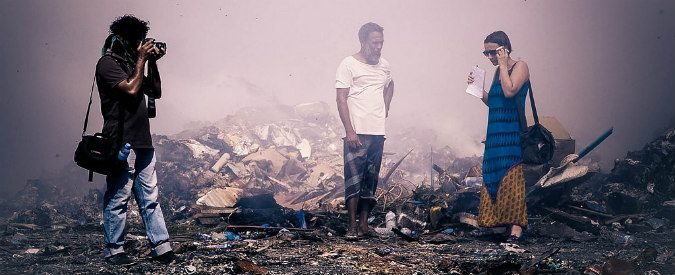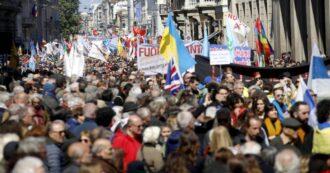It looks like sand. But it is rubbish.
Thilafushi is 4 miles from Male, it is a strip, a thin strip: just 2 miles long, and 200 meters wide. And it is an artificial island. It grows of a square meter every day: every day of 330 tons of trash. The Maldives don’t have an incinerator. It is too expensive.
It costs about 15 million dollars.
As ten new rooms in a resort.
There are only workmen, here. Thilafushi is also the Maldives’ industrial park. It has a cement plant, shipyards. And a number of small factories. Roads aren’t paved, and on the ground there isn’t even sand, actually: only this light mud which is a bit of everything, it is dirt, it is sand, it is water, it is concrete, soaked with rags, with scraps of cardboard, scraps of plastic, scrap of iron, some grass here and there, in this air dense of dioxin. It looks like Taranto.
It looks like Taranto. You breathe cancer.
Among these warehouses of asbestos and rust, and along the streets, old cars, old vans, hulls of fishing boats, old concrete mixers: next to the driver’s seat, instead of the gear shifter there is a shrub with yellow flowers. Workmen sleep here. Live here: in the back of factories. Or in the boats. In the boats they are fixing. They are opened, taken apart: inside, you can see the laundry hanging drying. Then they all wear safety shoes, the hard hat and a company T-shirt, they all look like ordinary workmen: but only because the owners need strong, healthy men. They pay for the hard hat. They pay for the gloves, should you cut your hands and stop for a week. But except for that, you can live on the beach. Without a shower.
In the end, there is the sea.
What is really protected, here, is just their ability to work.
They are all workmen; and they are all from Bangladesh. Most of them don’t speak English, nor they speak Dhivehi, the local language: they have never been in Male. And they have been here for years. Every day like the one before. But not only they believe this is normal: they feel lucky. Because they don’t spend a penny, in this way, and they can send home all their 250-dollar wage. In the Maldives, Syria is widely viewed as justice, Islam as liberation: and yet, it is not from here that jihadists come from, not from the poorest of the poor, who as ever, in history, are too poor, too busy surviving to struggle for a better life: or just to imagine it. No. Not only there is neither outrage nor frustration, here. There is no resignation. There is no sense of defeat, because there is no sense of fighting.
On the contrary. They bring you tea, smiling, they explain you how to check a wheel.
Because this is life, and that’s it.
Even though you can barely breathe.
A few meters away from factories, Thilafushi disappears. Literally. It disappears: suddenly, it all turns white. White and sharp. Waste is burned, piles and piles of waste: and the air is so toxic that despite leftovers of all sorts, there isn’t a stray cat around. Not a seagull. Not a dog, a mouse. Nothing. Only these workmen on a scooter, on a bike, on a van, who get into the fog and vanish, whistling, happily, with their hard hat and red overalls.
Half an hour, and you start feeling sick.
Half an hour, here, and you start spitting blood.
It’s tough, I am told by a young man with a blue T-shirt. He is shaping planks that another young man is painting off, and handing to him, in this air dense of salt and white spirit. He is 27, and he plans to return to Bangladesh in 15 years, more or less, and buy a house. A wonderful house, he says. How will it look like?, I say. It will have three rooms, he says. It will have everything. It will have a fridge, he says, it will have a oven.
It will have windows.
And he smiles, and he goes back planing.
He doesn’t know that in fifteen years he will be dead.
Which is somehow the story of all the Maldives, actually. Because the Maldives are just at the water’s edge. The highest point is 2,4 meters above the sea: they are the lowest country on earth. A meter and a half, on average. And according to the UN predictions, by the end of the century the sea will rise of 59 centimeters. Submerging it all.
Here not only five percent of the population holds 95 percent of wealth. But with that five percent left, the government is planning to buy land in Australia. Because in the end, simply, they will be all forced to move away.
Articolo Precedente
Maldives, in Himandhoo where ‘Islam is not a religion, it’s politics’

Articolo Successivo
Puglia, 7 arresti per favoreggiamento dell’immigrazione clandestina. Il denaro riciclato acquistando barche della Finanza







